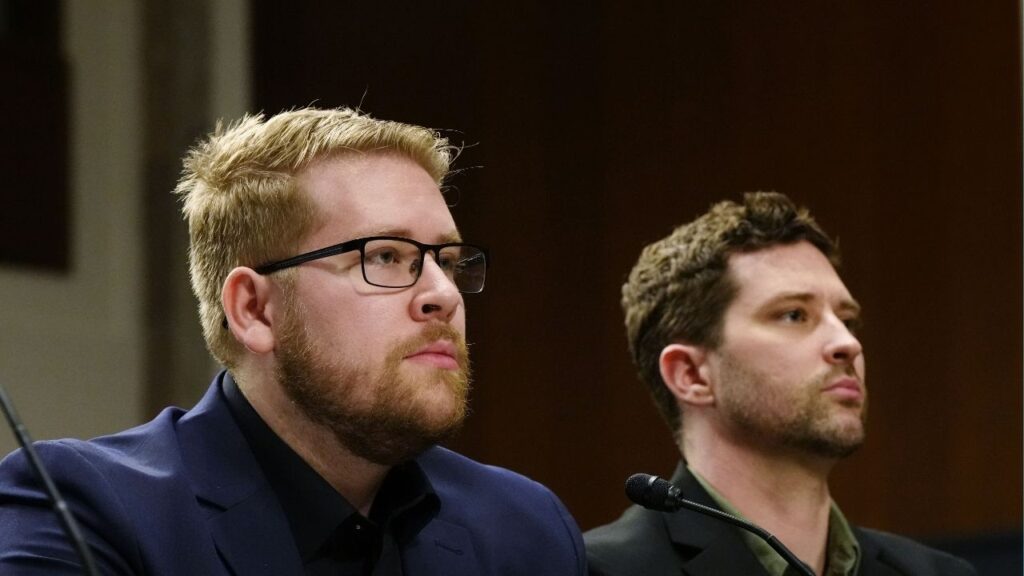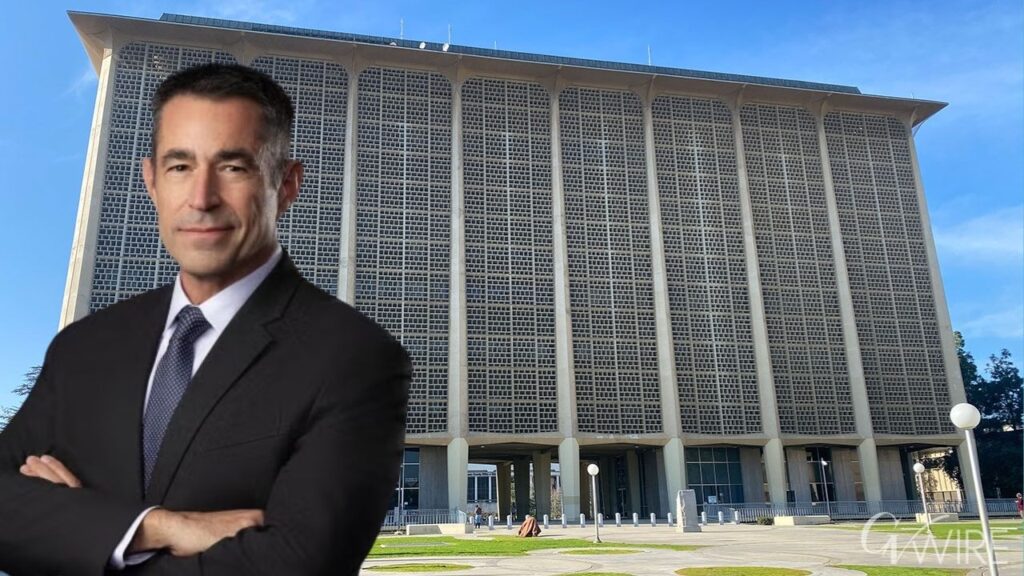Fresno County Schools Superintendent Dr. Michele Cantwell-Copher talks about challenges and accomplishments in her first two years in office. (GV Wire Composite)

- Fresno County Superintendent of Schools Michele Cantwell-Copher says addressing low academic achievement remains a top priority.
- She outlnes some of the accomplishments in her first two years in office, including opening new youth wellness centers.
- Even with the uncertainty of state and federal funding, Cantwell-Copher says she's optimistic that strong partnerships will keep things moving in the right direction.
Share
|
Getting your Trinity Audio player ready...
|
GV Wire sought an in-person interview with Fresno County Schools Superintendent Michele Cantwell-Copher to talk about her first two years in office, but she declined and instead provided written responses to the following questions:
Q: What challenges have you as superintendent and the Office of Fresno County Superintendent of Schools faced over the past two years, and how have those challenges been addressed?
A: Low academic performance has been a long-standing challenge in Fresno County, and it’s something I think about every day. When I stepped into this role, one of the first things we did was launch a countywide strategic planning process. Not surprisingly, the number one priority that emerged, loud and clear, was student achievement.
Community members, district leaders, and parents all agree: our role at the county level is to ensure that every student has access to a high-quality education, and that we support schools in delivering academic programs that meet the needs of today’s learners. We know the data and while there’s still work to do, we’re committed to supporting our districts in closing the achievement gaps.
While we’re not direct providers of education in most cases, we are embedded in supporting the systems that serve students. That includes initiatives targeting student safety, mental health, dual enrollment, expanded learning, and career technical education. These are essential foundations for academic success. Our job is to support districts with resources, data, and solutions that help them move the needle for their students. And I’m committed to doing that every single day.
Q: The biggest current challenge today appears to be the potential loss of federal funding. How are you and your office addressing that? Is migrant education in jeopardy?
A: We are keeping a very close eye on what’s happening at the federal level. At FCSS, about 19% of our operating budget comes from federal funds, but for many of our districts, that percentage is significantly higher. So any potential reductions would have a real impact for our districts.
Migrant Education is one area that could be at risk. If those funds are reduced or eliminated, our goal is to maintain services as best we can by running leaner, even more efficient programs while still supporting the students who need us most.
More broadly, our team is committed to being the voice of our students. We are using our voice to push for stability in funding and to keep student needs at the center of every conversation, especially those who are historically underserved or face significant barriers.
Q: What do you foresee to be the biggest challenges over the next two years?
A: We’re definitely at a unique time in public education. Schools are still recovering from the impact of the pandemic, and now we’re heading into a time of economic uncertainty. On top of that, changes at the federal level are creating a lot of questions around funding, which makes it tough for districts to plan ahead.
One of the biggest challenges we face here in Fresno County is poverty. It’s a real barrier to opportunity for many of our students. But the good news I believe is that education is one of the most powerful tools we have to change that. Through our work with Cradle to Career, we’ve brought together partners across the county to focus on long-term strategies that lift families up. That includes improving reading by third grade, increasing A–G completion, and helping more students reach their college and career goals. All of that connects to economic mobility.
Looking ahead, I think some of the biggest challenges will include:
- Helping students break through the barriers of poverty so they can have a real chance at success.
- Figuring out how to do more with less as budgets potentially shrink.
- Supporting students with their mental health and well-being.
- Keeping the momentum going on learning recovery, especially in reading and math.
It’s a lot, but we’ve got strong partnerships in place, an incredible team of dedicated employees, and a deep commitment to doing what’s right for kids. That gives me a lot of hope.
Q: What does the County Office of Education need to be doing more of than it does now?
A: Our core mission is to serve and support school districts, and I believe we’re doing strong, meaningful work in that area. At the same time, I’m a firm believer that we can always keep growing. The needs of students and educators are constantly evolving, and so should we.
We’ve made real progress in building strong relationships with our districts and community partners. But there’s always room to deepen that work and find new, creative ways to collaborate and be a more responsive service provider. Whether it’s working more closely with families, strengthening cross-agency partnerships, or listening even more intentionally to the voices of students and educators, we know that lasting impact happens when everyone is moving in the same direction.
We’re proud of the partnerships we’ve built, and we’re committed to doing even more to make sure every child in Fresno County is surrounded by the support they need.
Q: How does the Fresno County Office of the Superintendent of Schools fit in the hierarchy of education in Fresno County? What are your relations with school districts, Community College districts, and other educational organizations?
A: We’re what I would call a middle-tier support system, a bridge between the state and our 31 school districts. Our job is to interpret state mandates, provide guidance, and support implementation in a way that works for each district’s unique context.
We’re also a provider of programs that many districts can’t offer on their own, such as alternative education, juvenile court schools, and specialized services for students with disabilities. In addition, we offer professional learning, help manage fiscal oversight and provide operational support like district payroll and teacher credentialing.
Relationships are at the core of our work. Over the past two years, we’ve built strong, trusting partnerships with our 31 superintendents and their teams. I meet with them monthly to review data, talk through challenges, and collaborate on solutions. I deeply respect the work they do — it’s a hard job. I respect the importance of local control, and I believe our districts see that in the way we partner with them.
We also have strong partnerships with our community college districts and other local agencies. These relationships support a range of collaborative efforts, including dual enrollment opportunities, shared data systems, and aligned supports for students, which have made it possible for many Fresno County students to earn college credit while still in high school. I’m a strong advocate for our community colleges; they serve as a valuable steppingstone for many families. I attended one myself, so I know firsthand the doors they can open.
Q: What percentage of your office is public facing as opposed to the portion not as well known by the public?
A: I would say roughly 85 percent of our work is behind the scenes, with about 15 percent being public-facing. Most people see the student events, competitions, award ceremonies, and maybe some community workshops. But the bulk of our work happens in partnership with districts, quietly behind the scenes.
We do all the things I’ve already mentioned, and so much more. We operate specialized education programs, coordinate services for foster and homeless youth, manage career technical and workforce development initiatives, and lead trainings for educators and administrators across the county. We also support districts with technology infrastructure, health services, expanded learning programs, fiscal services, school safety training, and policy guidance. The list goes on. We may not be in every classroom, but the work we do directly supports the success of every classroom.
Q: What have been your biggest accomplishments over the past two years? What projects are you working on now that you hope to have completed within the next two years?
A: Over the past two years, we’ve made meaningful progress in several key areas.
Financial Stewardship: Since January 2023, we’ve saved over $2 million by addressing operational inefficiencies and reinvesting those dollars into programs that support students. I take our responsibility to manage public funds seriously, and I’m always looking for ways to stretch resources without compromising service.
School Safety: We’ve brought together law enforcement, school leaders, and mental health professionals across the county to strengthen safety plans and help ensure that our 206,000 students and 10,000+ educators are supported and protected.
Community Schools: We’re leading the way in California with a first-of-its-kind regional consortium Community Schools model. FCSS is serving as the backbone agency for eight districts and 39 school sites, helping coordinate services, reduce administrative burden, and build long-term partnerships that support the whole child and their family. With $47 million in Community Schools funding, we’re seeing big wins and real momentum.
All for Youth Wellness Centers: This year, we opened seven new wellness centers, bringing the total to 12, offering safe, supportive spaces where students can access mental health services and feel seen and heard.
CTEC High School: One of our most exciting success stories continues to be CTEC High School, where education is directly tied to workforce readiness. Over 50% of our 2025 seniors have job offers lined up before graduation. Even more impressive, 93% of our graduates this year earned an associate degree from Fresno City College before they received their high school diploma.
Looking ahead, there are a few key areas I’m especially focused on over the next two years.
First, I want to keep building on the momentum we’ve created around school safety and mental health. Too many of our students are struggling, and I feel a responsibility to make sure they’re not just safe at school but truly supported and thriving. That means continuing to expand access to mental health services and making those supports a normal, expected part of the school experience.
At the same time, everything we do has to come back to student achievement. Our kids deserve every opportunity to succeed, and we have to stay focused on improving outcomes, especially in reading, math, and college and career readiness. That means supporting districts with the right tools, strong data, and strategies that actually move the needle.
I also want to secure sustainable funding for the incredible work we’re doing through our Community Schools initiative. What we’re seeing in these schools is transformational, and we can’t let that progress stop just because grant funding ends in several years. We’re working to build a model that lasts.
Finally, I’m passionate about developing the next generation of leaders in our K–12 system. If we want long-term change for Fresno County students, we need strong, visionary leadership at every level. We just brought on a new Director of Educational Leadership Development, and I’m truly excited about what she’ll bring to this work.
These goals aren’t going to be fully accomplished in just two years, but I want to put my time, energy, and focus into moving the work forward. Every bit of progress matters, and I’m committed to making sure we keep moving in the right direction.
Q: There has been some criticism about your starting salary, which matched Jim Yovino’s when he left office. And the school board was divided about giving you a raise at the December meeting. What do you say to those critics?
A: The compensation for the County Superintendent position is determined by the County Board of Education and it is my understanding that over the years, they have used a benchmarking process to set the Fresno County Superintendent’s salary near the middle of comparable county superintendent salaries of a group of 10 similar-sized county offices across the state. This process compares and considers the size of county enrollment and operating budgets. I believe the County Board has appropriately set the compensation for the scope and complexity of this job using that benchmark process and I trust their collective wisdom to continue that into the future.
RELATED TOPICS:
Categories

Renee Good’s Relatives Speak to Lawmakers in Washington

















